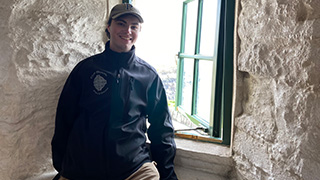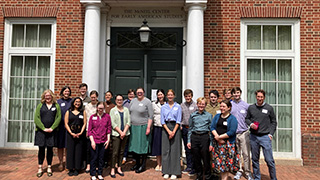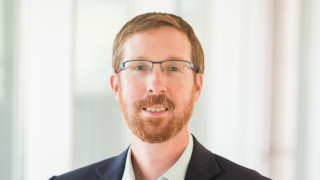Seton Hall Student Presents Research at UPenn - Seton Hall University
Wednesday, May 3, 2023

Pearse Gorman
A Seton Hall University undergraduate History major, Pearse Gorman, was selected to participate in the 2023 Undergraduate Research Workshop at the McNeil Center for Early American Studies (MCEAS) at the University of Pennsylvania. According to the MCEAS website, "the Workshop provides a structured environment in which students can come together with undergraduates from other institutions, as well as graduate students and faculty, to discuss the ideas, source materials, and methods of their own research."
This prestigious, competitive program pairs each participating undergraduate working on an honors thesis or other research project in early American studies with a graduate or postdoctoral fellow at the McNeil Center who serves as a mentor during the research process.
The Undergraduate Research Workshop, which was directed this year by Christopher Bilodeau, Ph.D., of Dickinson College, began on February 10. Participating students met one another and their mentors, sharing information about their projects. They also received a private tour of the University of Pennsylvania's Kislak Center for Special Collections, Rare Books, and Manuscripts. The day concluded with the McNeil Center Friday Seminar, a leading venue for presenting research in the field of early American studies. The featured speaker was Matthew Kruer of the University of Chicago, whose topic was "The Conestoga 'Commonwealth': Indigenous Constitutionalism and Settler Counter-Sovereignty."

Participating undergraduate researchers and mentors outside of the McNeil Center.
The second part of the Undergraduate Research Workshop took place on April 21-22. On April 21, participating students had the opportunity to discuss the research process with Professor Michael LaCombe of Adelphi University, followed by a discussion of his paper, "Staking Claims: Founding Myths and Property Formation on Seventeenth-Century Long Island, 1648-1745." On Saturday, April 22, the students presented their papers in a conference at the McNeil Center. Each paper received its own comment from the author's mentor and the student authors fielded questions about their work from the audience, composed of undergraduate participants, faculty advisors, fellow mentors, and others.
"It was a fantastic experience participating in this year's MCEAS URW," Pearse said. "Not only was the event a great way to have a new perspective on the world of academia, but it also allowed me to view and learn about sources for my project that I otherwise may have never seen or known about. I was able to look at original print copies of sources I had been using. The leadership, MCEAS fellows, and presenters I worked alongside were amazing and I would recommend the event to any undergraduate who has a chance to participate in future workshops."

Professor Sean Harvey, Ph.D.
Pearse's paper, "The Shapeshifting Wendigo: Dispossession of an Indigenous Monster," focused on a monster story told by Anishinaabeg, an Indigenous people of North America, and its continuous reinvention by non-Indigenous writers from the 1600s to the present day. It was drawn from his thesis for Honors in History at Seton Hall, directed by Sean P. Harvey, Ph.D., Associate Professor of History. Pearse, who credited another member of the History faculty, Anne Giblin Gedacht, Ph.D., for first teaching him how history can be analyzed through such legends, stressed the importance of the his topic. "The Wendigo in recent years has been fairly popular in every media imaginable and is known by the majority of the general public. However, the Wendigo we know today is far from the original Indigenous interpretation being used to misrepresent Indigenous culture. The monster is surrounded by a history of appropriation and exploitation, and I think it is important for this problematic past to be recorded and acknowledged in future discussions and works on the Wendigo, otherwise the trend of the myth being dispossessed from its Native origins will continue."
The MCEAS Undergraduate Research Workshop was established in 2008. It has been attended by students from such schools as Brigham Young University, Bryn Mawr College, Catholic University, Fordham University, Gettysburg College, Iona University, Johns Hopkins University, Lehigh University, New York University, Pennsylvania State University, Princeton University, Temple University, the University of Maryland, and the University of Pennsylvania. Seton Hall students have participated in the seminar on several occasions, including 2017, 2018, and 2020.
Categories: Arts and Culture, Education, Research






